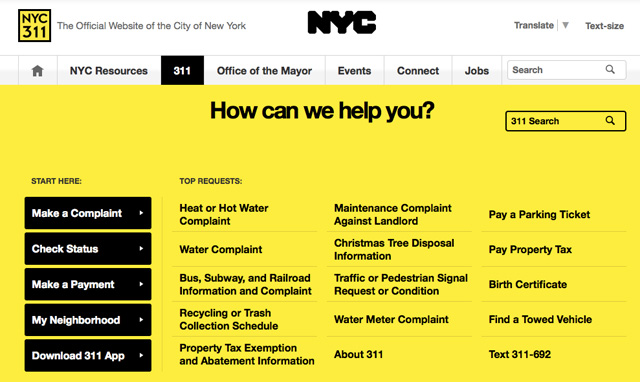By Jessica Cruz Mateo
What do you do when someone drops a toilet on the sidewalk near your apartment? Call 3-1-1, of course. Begun in 2003, NYC 311 provides information to residents about 300 agencies involved in a range of health and human services. The most common calls are for noise, parking tickets, garbage or recycling collection, heat, bus/subway information, landlord maintenance, police service area and plan examiner appointments.
The NYC 311 hotline is available 24 hours, seven days a week. The city non-emergency hotline has received more than 158 million total calls since 2003 and it is available in 180 languages, online and via text. This year commemorates 10 years of NYC 311. Text access was launched two years ago.
Diana De Los Santos, who is a resident of the Bronx, called 311 about five years ago when power lines across the street from her house fell. The fire department came right away to fix them.
“I was looking outside of my window randomly and I saw a group of people in a truck dumped things in front of the school,” says De Los Santos. “It was a high school and they dumped a toilet, they dumped trash bags. I decided to call 311 because that is obviously illegal. People don’t care about the low income areas. I did not want to ruin my neighborhood even more than already it was.”
One of the challenges facing the program is educating New Yorkers about the difference between 311 and 911, says Lyann Arias, who is a caller representative of NYC311. “My first call experience in 311 was extremely nerve-wracking,” she says. “I had heard a story from a previous worker where they received a 911 call on their first call. I was extremely nervous that the same thing was going to happen to me. The first time I received a call, thank God it was not a 911 call.”
Lehman student Jeffrey Justice, who is a former call representative of NYC 311, said at times the calls were offbeat. “Some guy said ‘They are trying to get me.’ I don’t know who they were but he just said ‘They are trying to get me.’ What I did was transfer him to 911.”
New Yorkers call NYC311 most frequently to ask about the garbage pickup schedule and parking tickets.
“A lot of people call because they received tickets and they did not know they have them three months later,” says Arias. “They have a whole bunch of penalties. They are calling to either complain, or yell at you over the phone. You have to just stay calm and give them the information they need to pay that ticket.”
NYC 311 call representatives have a month-long 40-hour-a-week training. The trainees are taught how to handle calls and how to find information that callers might need. “You have to know about the system,” says Arias. “You also learn a lot about different government agencies and what they do for constituents.”
NYC 311 offers coaching sessions where caller representatives sit with their supervisors and go through the opportunities that they have during taking calls.
“Something that I had a really big issue with at first when taking a call would be my tone,” says Arias. “I would pick up the phone and sound extremely bored. It didn’t sound like I wanted to hold the caller. It was something that I had to fix over time. Another thing that I had to fix was dead air, the awkward silence between the caller and myself. I had to just minimize that time by using filers, while I was looking for the information.”
There have been instances in the center where staff receive calls from somebody that they know. “We are supposed to actually completely ignore the fact that we know you,” says Arias. “We are suppose to keep acting professionally and handle the call like any regular call.”
On rare occasions, a New Yorker calls up with a surprising comment, like the caller who simply wanted to say good work. “It was a little weird,” says Arias. “They called to say ‘Hey you guys are doing a great job’ and ‘The mayor is awesome.'”





